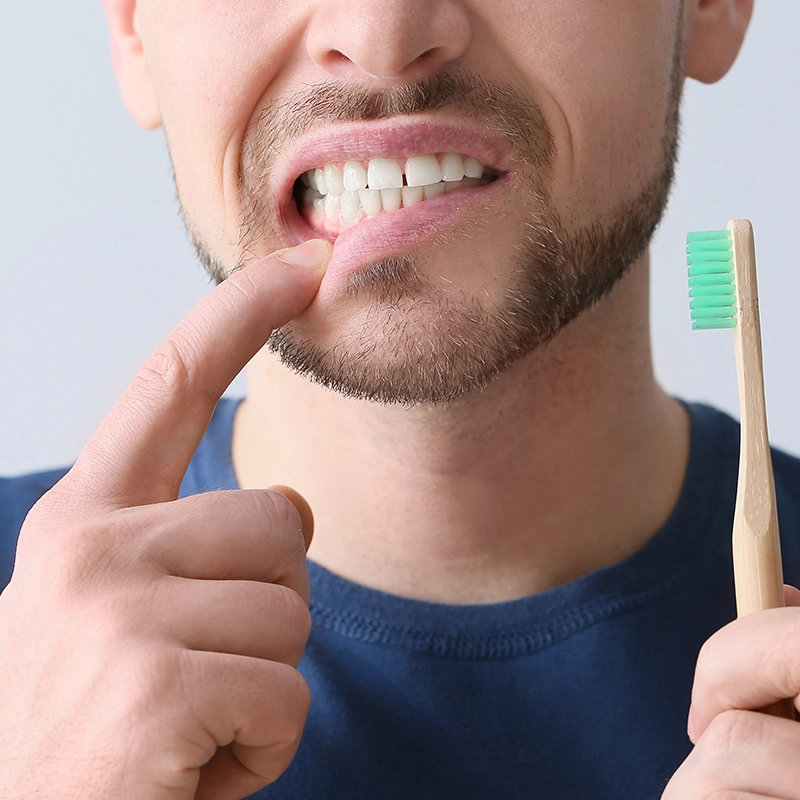
Oral psoriasis is a type of psoriasis that affects the mouth and the areas around it, such as the lips and the inside of the cheeks. It is a chronic autoimmune condition that causes red, scaly patches to form on the skin. Like other forms of psoriasis, oral psoriasis is not contagious and cannot be spread from person to person.
Symptoms of oral psoriasis may include red patches on the skin inside the mouth, cracked or bleeding lips, and a burning or tingling sensation in the affected areas. The condition can be treated with medications prescribed by the best dental doctor in Bangalore, as well as good oral hygiene and a healthy lifestyle.
Symptoms of Oral Psoriasis
The symptoms of Oral psoriasis include:
- Red patches or lesions on the tongue, gums, or inner cheeks
- Burning or soreness in the mouth
- Dryness or cracking of the lips
- Difficulty swallowing or eating
- Swollen or tender lymph nodes in the neck
- Thick, white patches on the tongue or inside of the cheeks (oral leukoplakia)
- Loss of taste or altered sense of taste
- Bleeding gums or mouth sores
- Foul breath or taste in the mouth
Diagnosis of oral psoriasis
Oral psoriasis is typically diagnosed based on the appearance of the mouth and any symptoms the person is experiencing. They may also perform a biopsy of the affected tissue to confirm the diagnosis.
In some cases, additional tests may be needed to rule out other conditions that can cause similar symptoms such as:
- Oral lichen planus
- Oral candidiasis
- Oral thrush
- Leukoplakia
- Oral cancer
- Herpes simplex virus
- Behcet's disease
Treatment for Oral Psoriasis
Treatment options for oral psoriasis may include:
- Topical medications: Ointments or gels applied directly to the affected areas of the mouth.
- Phototherapy: Using light therapy to help reduce inflammation and control symptoms.
- Systemic medications: Oral or injectable medications that work throughout the body to control the immune system and reduce symptoms.
- Corticosteroids: Powerful anti-inflammatory medications that can help control symptoms.
- Biologic medications: Targeted medications that specifically target the immune system to reduce inflammation and control symptoms.
In addition to these treatments, people with oral psoriasis need to maintain good oral hygiene and avoid triggers that can exacerbate their symptoms, such as tobacco use and alcohol consumption.
If oral psoriasis is left untreated, it can lead to several complications. These may include:
- Infection
- Difficulty eating and swallowing
- Poor oral hygiene
- Social and emotional effects
Therefore, it is important to seek treatment for oral psoriasis to prevent these complications and manage symptoms effectively.
Does Oral psoriasis lead to cancer?
Oral psoriasis itself does not directly lead to cancer. However, certain factors that can be associated with oral psoriases, such as smoking and excessive alcohol consumption, can increase the risk of oral cancer. Additionally, untreated oral psoriasis can cause a condition called oral leukoplakia, which is a precancerous condition that can develop into cancer if left
untreated. Therefore, people with oral psoriasis need to seek regular check-ups and treatment to prevent the development of oral cancer.
Oral Psoriasis Prevention Tips
Prevention of oral psoriasis includes:
- Avoid known triggers
- Maintain good oral hygiene
- Avoid the consumption of tobacco and alcohol
- Seek regular check-ups
- Manage underlying conditions
People with oral psoriasis may also have a higher risk of developing other autoimmune conditions, such as Crohn's disease or inflammatory bowel disease. Additionally, oral psoriasis can lead to complications such as infection, tooth loss, and difficulty eating or swallowing. It is, therefore important to consult with doctors at Sakra World Hospital, if you are experiencing any symptoms or complications and get the best psoriasis treatment in Bangalore.

